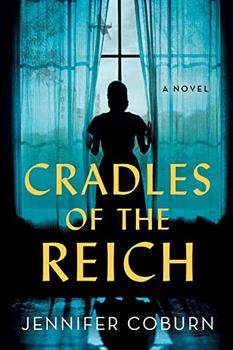Summary | Excerpt | Reading Guide | Discuss | Reviews | Beyond the Book | Readalikes | Genres & Themes | Author Bio

A Novel
by Jennifer Coburn
On the corner where the alley met a wider street, Hilde spotted a newsstand with its valance of color magazines and stacks of newspapers from around Germany. A young mother bent down to hand her daughter a cookie frosted to look like a daisy. It could have only come from the bakery near the Rathaus. Hilde had her bearings again and turned the corner to continue home.
Narrowly escaping the nose of a blue tram emerging from the clock tower archway, Hilde took a moment to admire her city. She wondered if she would ever grow tired of Munich's bustling Marienplatz or the city's magical skyline, its delicate spires and fanciful turrets, the town hall with its façade that looked like church organ pipes.
Hilde turned toward home and strode efficiently, staring down at her green leather shoes. She had finally convinced her mother that she was adult enough to wear high heels. Hilde's pumps lifted her only five centimeters from the ground but had a sophisticated lacelike pattern of leather around the topline that could not be found on the shoes in the girls' section in the store. She loved the way they made her feel, though sometimes it was hard to tell what elevated her more: the heel or the concession from her mother.
As Hilde crossed Dienerstrasse, she watched people chatting with one another and saw them through the windows of cafés, sitting down for a bite. Everyone seemed to know their place in the world. They were salesgirls or shopkeepers, a young woman buying a brooch, a man shopping for a necktie. Could Hilde really be the only person who felt this unmoored? Quickening her pace, she asked herself what she would do when school ended. A few of the girls she knew would be attending Ludwig Maximilian University in the fall, but Hilde was thoroughly uninterested in four more years of geopolitics and race science. She was relieved that her parents weren't the type to push her toward university, but without a plan for the future, her lack of suitors was escalating the tension she felt at home.
It wasn't as though all German girls were marrying straight out of Gymnasium. Jutta had married an illustrator with the Ministry for Public Enlightenment and Propaganda a year earlier. Jutta was twenty-three by then but had never seemed anxious; she knew her pretty face would always net prospects. Hilde's father's offer to find her a secretarial job within the Reich sounded dull. A year of Land Service had some appeal, though Jutta had warned Hilde it wasn't all mountain hikes and stargazing. Other girls had returned saying that they rose with the sun to do heavy farmwork, complaining of sore shoulders and chapped hands. Hilde thought her host family would take one look at her sturdy form and strap a plow onto her back.
What she wanted most was something she couldn't admit to anyone—to be an actress. She always had her friends at BDM in stitches with her comedic impersonations. How she would love to be the next Gracie Allen or Zarah Leander. Hilde realized she didn't have a single person with whom she could share that dream, not even Jutta, who was so involved with her new family that she barely asked Hilde about herself anymore. Margot was too much of a gossip for Hilde to risk sharing anything of value. Hilde felt isolated, but she also knew that self-reliance like hers was an asset. She had friends in her life for fun and amusement, but Hilde didn't need any of them.
The last people she could talk to about her dreams were her parents, who now seemed singularly focused on people's productive contributions to Germany. Franz had never been a particularly affectionate father, so his exaggerated stoicism after becoming a Schutzstaffel officer six years earlier had not surprised Hilde, nor had it affected her much. Johanna, though, had once been the picture of content motherhood, sometimes even joining her children on the playground rings and poles. Once, Hilde even convinced Johanna to try the Rome wheel. Her mother shrieked with a combination of thrill and terror as Hilde and her friends rolled her nearly upside down in the wheel. There was something about seeing Johanna's bloomers on full display that made Hilde realize her mother was an imperfect person. She had never loved her more.
Excerpted from Cradles of the Reich by Jennifer Coburn. Copyright © 2022 by Jennifer Coburn. Excerpted by permission of Sourcebooks. All rights reserved. No part of this excerpt may be reproduced or reprinted without permission in writing from the publisher.
Your guide toexceptional books
BookBrowse seeks out and recommends the best in contemporary fiction and nonfiction—books that not only engage and entertain but also deepen our understanding of ourselves and the world around us.